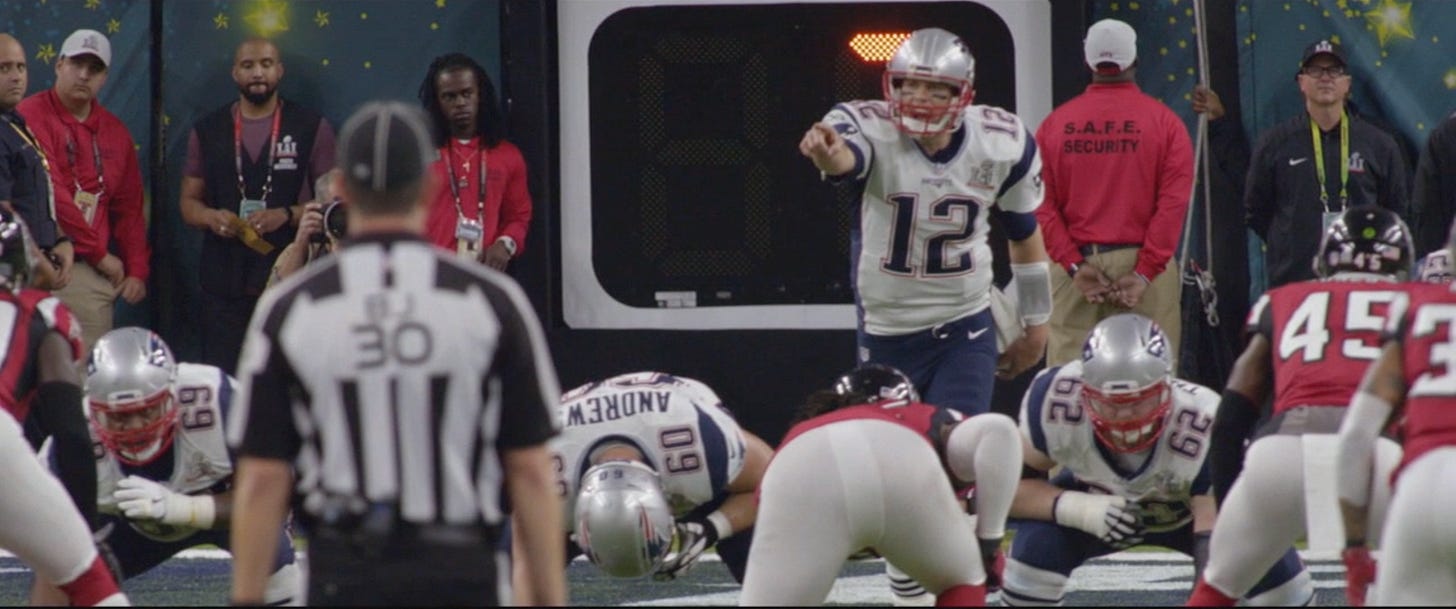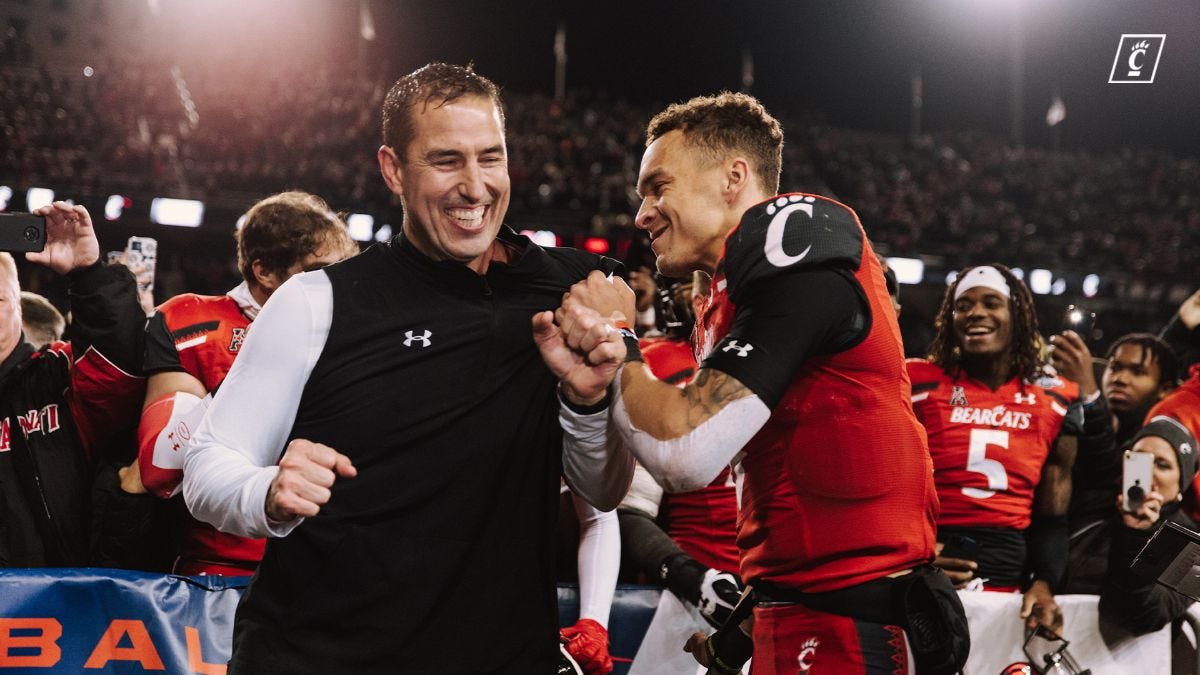Before we begin, I wanted to take a second to thank all of you for reading our newsletter throughout 2021. It's been so special to grow this community and hear from you all every week. As always, you can just reply to these emails if you have any thoughts, comments, or just want to say hello. Have a wonderful New Years, and here's to lots of exciting stuff coming in 2022!
Now back to our regularly scheduled programming, as we continue to examine every new episode of Man in the Arena to better understand what each of Tom Brady's Super Bowl seasons can teach us about the nature of competition—and of life. Enjoy, forward to a friend, and Happy New Year from all of us at ROS!
On Fox’s pregame show before Super Bowl LI in 2017, the New England Patriots vs the Atlanta Falcons, Terry Bradshaw sat down to interview the then-39-year-old Tom Brady. The big headline generating question: If you beat the Falcons later today, would you retire?
“Hell no,” Brady told Bradshaw. “There’s no way.”
And then the first half of that game happened, the Patriots getting blown out 28-3, and the chatter started again. Brady doesn’t have it. Time for him to call it quits. When he led the greatest comeback in NFL history and earned his fifth ring, the chorus started all over again, back to the original tune. What more is there to prove? Even Gisele Bündchen begged her husband to hang it up.
As we hear from Brady in the latest episode of our series Man in the Arena, out now on ESPN+, there was nothing anybody could have said, nor was there anything that could have happened, that would have kept him off the football field the following year. As he said in the episode, “I didn’t want to ride off into the sunset knowing that I have a lot left to prove.” He paused for a beat, needing to clarify, because there was nothing Tom Brady had left to prove to anybody. He continued, “A lot left to prove to me.”
By this point in the Brady story, his greatness was undeniable, he owned half the NFL’s record book, and each finger had its own Super Bowl ring. Had he been wanting to win for other people, for glory, respect, or anything else measurable, he would have run out of gas way back in episode three. Instead, as Brady revealed this week, his legend was fully self sufficient.
For so much of the past two years, it’s been easy to fall in the trap of wondering, “What’s the point?” If nobody’s watching, why try? Nowhere is this more clear than in sports, where we watched athletes compete in empty arenas, playing for ghosts. Without the roar of the crowd, where could our athletes find that final edge to push them over the top? Not everybody could. I’m not sure if I could have.
Maybe that’s why when I heard this revelation from Brady, it felt like he was sticking his head out of my TV and shouting it right into my ear, telling me that to do something truly great and truly unexpected, you have to find motivation from somewhere deep within your soul. It last longer that way. It’s more rewarding. And so, as we brace for another wave of cancellations, maybe that’s why this insight from Brady felt like the perfect thought for this New Year. A challenge, mediation, and apt-reminder of how a 39-year-old, with nothing left to prove, came back from insurmountable odds while everybody else tried to tell him what to do: “It’s two minutes left in the game. You’re down by 10 points. Should I whine? ‘Oh, what happened in the first quarter? What happened in the second quarter?’ No. This is the situation we’re in. What are we gonna do about it? Are we going to fix it? Are we gonna cry and bitch and complain that it’s not the way we want it? What attitude are we going to take on?”
– Joe Levin
Now Streaming: Man in the Arena Podcast
In addition to the docuseries, we’re also producing a Man in the Arena podcast, in which Gotham Chopra explores two decades of Brady’s career through the eyes of the fans and haters, those inside and outside of the arena. Each episode grapples with the ways in which Brady has altered our understanding of sports. In episode seven, Gotham explores the concept of probability. When Brady was down 28-3, the Patriots had a .02 percent chance of winning the game, according to models. Does their victory prove that our probabilities are wrong—or just our understanding of them?
So Let It Be Written...
Doubt Stetson Bennett at Your Own Risk
By Pat Forde • Sports Illustrated
Get to know Georgia quarterback Stetson Bennett, who will lead the Bulldogs in today’s CFB Semifinal against Michigan. This is the story of how he went from being assigned half a locker when he first stepped foot on campus to a star of one of the best teams in the nation.
What a Science Teacher Taught the Dallas Cowboys About Coaching
By Andrew Beaton • The Wall Street Journal
When the pandemic hit, the Cowboys coaching staff went back to school.
Instant connection: Notre Dame's Marcus Freeman might change the game as we know it – by being himself. Is it enough to lift the Irish?
By Pete Thamel • Yahoo! Sports
Notre Dame’s brand new coach, Marcus Freeman will coach his first game for the Irish this weekend. Already, he’s finding ways to connect to his players with the adeptness of a veteran.
@GoBearcatsFB
America’s Team—For Today at Least
Later today, the Cincinnati Bearcats will face the Alabama Crimson Tide in the College Football Playoff semifinal, and unless you’re from the great state of Alabama, that means that for the day, you’re a diehard Cincy fan. Which means you need to know a little bit about how the biggest underdog in CFB Playoff history got to the biggest stage in the sport—just enough to impress the folks at your New Year’s Eve celebration.
They’re led by Luke Fickell, a former Ohio State nose tackle who had become an assistant for the Buckeyes after his playing career. Fickell was a longtime assistant when Cincinnati called, with his only head coaching experience coming in one season with the job for Ohio State, when he led his alma mater to its first seven loss season since 1897 (not a typo!). Cincy fans, understandably, weren’t thrilled with the hire. As one columnist wrote at the time, “I’ll cut to the chase: On the surface, this is not what most UC fans were looking for.”
What they didn’t know was that after his Ohio State debacle, Fickell started to reflect on what went wrong. And his conclusion was that he was coaching for the wrong reasons, and therefore doing the wrong things. He was trying to emulate his former bosses, recycling their greatest hits. "You can't be Jim Tressel, you can't be Urban Meyer, you can't be John Cooper,” he realized. “You’re a part of all of them because you spent a lot of time with them—but you've got to figure out who you are.”
And who is Luke Fickell? A tough, family-oriented football coach. It’s exactly what he’s built since. "It felt like a breath of fresh air," said one linebacker. "It was a new way of things happening.” They’ve gone 48-14 since that new beginning. And Fickell, like Brady, demonstrates just how powerful it can be when you search for motivation in an inner, authentic place.
@tthomander
A Picture Is Worth a Thousand Words
I found this image on Twitter, taken of a young girl playing hockey in Peggy’s Cove, Nova Scotia. How fine is this?
Sports Illustrated
Old School
Busman’s Holiday (1990)
By Peter King • Sports Illustrated
The late John Madden hated to fly, and so he rode in a bus across the country to call NFL games. In this phenomenal piece, Peter King rides shotgun for a week and comes away as vivid a portrait of Madden’s genius as anything ever written.
Last Word
“I was like, we need a lot of s*** to go right now. 28-3, man. Coach [Belichick] said 21 points isn’t going to be enough to beat us, 28 points might be enough to beat us today.”
– Tom Brady on Super Bowl LI









